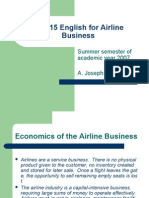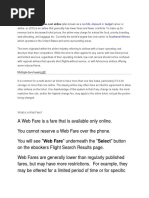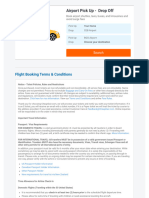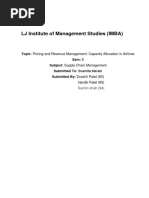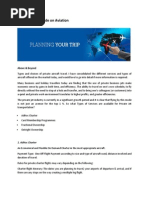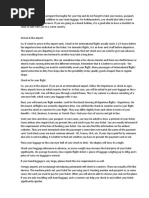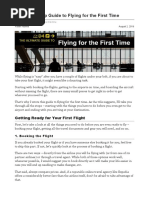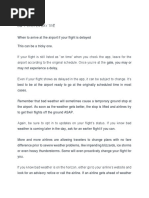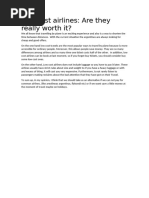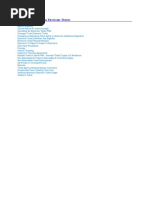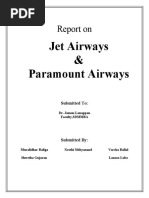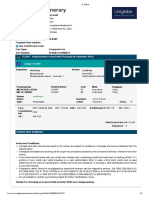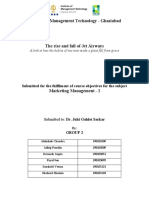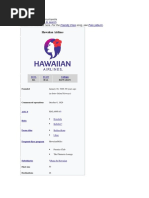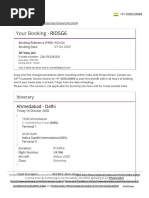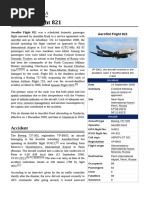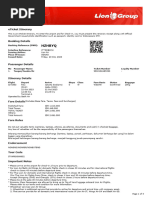Airline Terms
Airline Terms
Uploaded by
Venus HatéCopyright:
Available Formats
Airline Terms
Airline Terms
Uploaded by
Venus HatéCopyright
Available Formats
Share this document
Did you find this document useful?
Is this content inappropriate?
Copyright:
Available Formats
Airline Terms
Airline Terms
Uploaded by
Venus HatéCopyright:
Available Formats
What is an Airfare?
You don't always know what you are going to get when you purchase an airline ticket. Why is it that every person on a flight may have paid a different price to fly? Can you change or cancel your tickets, and if so, at what cost? The airlines have a seemingly secretive formula for constructing airfares. Knowing what types of airfares exist, and how they apply to your travel may not mean that airfares make sense, but you can at least make sense of them. Simply put, an airfare is the price a passenger pays in order to travel by air. The types of fares, rules and restrictions, taxes, etc., are all components that complicate the price involved for a passenger to fly from one place to another. Fares are most often based on one-way or round-trip travel. Fares may be published, unpublished and/or negotiated fares (corporations, or government agencies/organizations may have fares negotiated with an airline at a lower rate). Unpublished fares are also known as consolidated fares and are offered by consolidators and bucket shops.
Published Versus Unpublished Fares
A published fare is one that is available for purchase by anyone. You could call the airline, or check for prices online, and published fares will be immediately available for purchase. The rules of such fares are readily available and if there is more than one airline offering the same fare you can count on the rules being virtually the same. A non-refundable fare requiring an advance purchase of 14 days and a minimum Saturday night stay would be just a few of the possible rules of a published fare. Seat sales launched by airlines are considered published fares as well since (subject to seat availability) such airfares are offered to the public. Unpublished fares are an entirely different beast. They may be seats that a consolidator purchased and can offer at highly discounted rates. The fare rules could literally contain anything from absolutely no changes allowed to free changes as long as availability exists. They may or may not allow for advance seat selection or the accumulation of frequent flyer miles. If you called an airline looking for the rules to an unpublished fare you would be out of luck. They are not offered for sale by the airline online or over the phone with the airline.
The ABCs of Airfares
When booking a ticket, regardless of whether it is using a published or unpublished fare, there are letters that are assigned to different fares. These letters indicate the class of service, not simply indicating economy or business class, but rather the type of fare that was purchased. Without getting into the particular rules of each fare type, letters are assigned by the airlines to indicate the kind of ticket that has been purchased. F, P are the letters most commonly used to indicate First Class. J, C are the letters most often used to represent Business, or Executive Class. Y is almost universally used to indicate a full fare economy ticket. B, H, L, M, V, etc. are just some of the letters indicating subclasses (reduced, restricted, and/or discounted fares). These letters vary by airline and in value. On one airline B may be indicative of a more expensive ticket. On another airline L may represent a ticket booked on a seat sale.
X, U, R are a few of the letters commonly used to indicate a fare purchased from a consolidator. If you have booked a discounted fare and are interested in the subclass you are holding, the letter immediately follows the flight number on your ticket and will fall under the heading of Booking Class or some similar, shortened version.
Types of Published Airfares
The following is a list of the main types of published airfares - and are usually based on round-trip or oneway travel:
APEX fares are discounted international fares. Such fares usually require tickets to be purchased in advance (such as 7, 14, or 21 day minimum advance purchase), and will have other restrictions non-refundable, change fees are just a few of the possible restrictions. Discount Fares are fares that tend to have a smaller price tag, and are offered for a limited time (seat sales would fall into this category). They usually have a long list of restrictions such as specific travel dates, minimum and maximum stay (for example, a minimum Saturday night stay, a maximum 30 day stay), etc. Unlike most published fares, it is important to make sure that you are aware of the fare rules and restrictions on discount (seat sale) fares. Keep a copy of the rules because seat sale fares come and go quickly, and the rules and restrictions can be harder(sometimes impossible) to retrieve online. Excursion Fares are lower priced fares that involve restrictions like advance purchase, time of year, minimum/maximum stay, etc. Unrestricted, Flexible, or Full Fares are the titles given to the most expensive tickets. You pay for a ticket that allows you to refund or change the ticket as necessary for fares that can be purchased at any time, even the same day of travel. Joint fares are offered by airlines that have some sort of partner relationship on select routes. They essentially give a passenger a price break when you are using more than one airline to get somewhere. Joint fares have their own set of restrictions, not unlike those already mentioned for excursion and discount fares. A through fare is a fare to a destination reached by traveling through a gateway city. It could be combined with any of the fare types listed above, and is used to obtain a lower price when you are not simply flying from point A to point B, but are rather connecting through other points to get to your destination. If you are traveling from Atlanta to Athens via Frankfurt, you may be offered a through fare, so that instead of paying for Atlanta to Frankfurt and Frankfurt to Athens, you pay one fare for Atlanta through to Athens.
For the sake of profits, airlines will not offer every seat on an aircraft at the seat sale fares, or excursion fares. As flights fill, the least expensive fares disappear regardless of how far in advance it is. Unless you are on a full fare ticket you can be certain that there will be any number of restrictions involved with your airfare - minimum/maximum stay; time of day; weekday, weekend price differences; change fees; mileage (on through fares you may be restricted to a certain number of miles to get you to your destination), advance purchase; youth/child/senior rule differences; etc.. So many fare types, even more fare rules. Considering that airline tickets are contracts between passengers and airlines it is important to know what you are signing up for.
The Language of Air Travel Defined
There is a different way of talking and writing in the air travel industry. The Air Travel Glossary takes those cryptic acronyms and airline-speak --- and defines them! Your Air Travel Guide wants to help make air travel lingo make sense. This list of airline industry terms and definitions is fairly comprehensive - if there are terms or odd looking acronyms that are not addressed here please let me know. In the meantime, take a look at the definitions for all things related to air travel!
Actual Flying Time - The actual time that an aircraft is in the air - does not include time on the ground (waiting in line for take-off, for example). ARNK - Pronounced Arunk - The abbreviated form of Arrival Not Known. Used in computer reservations systems to indicate a portion of an air travel itinerary that does not involve a flight. A passenger travels from Boston to Madrid. He makes his way to Barcelona by train. He flies back to Boston from Barcelona. The portion from Madrid to Barcelona would be an ARNK. Min/Max - Definition: The abbreviated form for Minimum/Maximum stay - refers to the minimum and maximum times allowed for travel on a ticket. Minimum and maximum stays are restrictions often imposed on discounted fares. Weekend fares are examples of tickets with minimum and/or maximum stays. A weekend fare will typically allow a passenger to begin travel on a Friday or Saturday, and return Monday or Tuesday. In this example, the minimum stay would be a Saturday night, with the maximum stay being the Monday or Tuesday. Back-to-back ticketing - Considered an illegal practice by the airlines. When a passenger does not meet the requirements of a discounted ticket (usually the Saturday night stay requirement), and is traveling more than once to a destination on business, a passenger may purchase two tickets. For one ticket, the city of origin is the starting and ending point of the ticket. For the other, the destination city serves as the starting point of the ticket. Airlines that discover back to back ticketing may issue a warning; confiscate the ticket; assess a fee; etc. For example, a passenger is traveling from Houston to Cleveland two weeks in a row from Monday to Wednesday both times. The first ticket would read Houston-Cleveland(first Monday), and Cleveland-Houston(second Wednesday). The second ticket would be ClevelandHouston(first Wednesday), and Houston-Cleveland(second Monday). Bumping - Passengers that are denied a seat on the flight they originally booked on due to a flight being oversold. They will then be `bumped' to another flight. Base Fare - The price of a ticket before any taxes have been added. Black box - Also known as the Cockpit Recorder or the Flight Data Recorder. Records all of the data transmissions such as altitude, air speed, etc., and the voice and sound transmissions. Black boxes are not black, they are brightly colored in order to find them more easily amongst the wreckage after an accident. Bulkhead - The physical walls on an aircraft that separates the plane into different sections (such as business class and economy class). Bulkhead seats - The seats on an airplane that are immediately behind the bulkhead (see definition of bulkhead). These seats usually have limited storage, and may have either more leg room or sometimes less leg room. Carry-on - Luggage that is permitted to be brought on to the aircraft by the passenger.
Circle trip - Definition: A trip that involves more than one destination. An example would be London to Milan, then Milan to Frankfurt, and return to London (with Milan and Frankfurt both being destinations). Commercial airline - An airline that transports passengers. Code share - An agreement between airlines to sell space on each other's flights. The flights will have both the operating carrier's flight number (the airline that is using its aircraft for the flight), and the codesharing flight number (the partner airline in the agreement sells space on the flight as if it were its own, and has its own flight number). For example, Air Canada operates flight AC812 from Chicago O'Hare to Toronto Pearson. United codeshares on this flight, selling space as UA3094. Consolidator - A company that negotiates the purchase of blocks of tickets from an airline and sells that space (at some sort of discount) to the traveling public. Also Known As: (sometimes) Bucket shops Cockpit - The compartment at the front of the plane containing all of the devices required to fly an aircraft. Comp - The abbreviated form of Complimentary - any freebies or complimentary extras. Call sign - The title used to identify an aircraft for communication purposes. An example would be Air Canada 856 (A flight from Toronto to London). Connection - The additional flight(s) required to get from the airport of origin to the final arrival airport. For example, Salt Lake City to London with a connection in Chicago means a change of planes in Chicago. Contract of carriage - The legal contract between the passenger and the airline, issued with the ticket. Direct Flight - A flight that stops at another airport, but passengers do not change planes. An example of a direct flight is a passenger taking a direct flight from Boston to Dublin. The flight first stops at Shannon Airport and then continues to Dublin, with the passengers traveling to Dublin staying on the same plane. DALPO - The abbreviated form of do all possible, used in computer reservations systems. DOUBLE BOOKING - Booking two or more reservations when only one will be used. Doing this can lead to all reservations involved being canceled. ETA - The abbreviated form of Estimated Time of Arrival, used in computer reservations systems, airports, and by the travel industry. E-TICKET - Also known as Electronic Tickets or Ticketless Travel.
A ticket that is not physically printed on ticket stock, and is instead stored in the computer reservation system of an airline. E-ticket holders are issued a receipt, contract of carriage, and flight itinerary as proof of travel documents. EXCESS BAGGAGE - Luggage that exceeds the airline's allowable limit for weight or number of pieces. Passengers are usually charged extra for excess baggage, if excess baggage is permitted at all. EXCURSION FARE - A lower priced fare with restrictions, like advance purchase, non refundable, etc. MINIMUM CONNECTING TIME - The legal minimum time necessary to change planes at a given airport. If this is ignored, the connection is called an illegal connection. INVOL - The abbreviated form of Involuntary denied boarding. Refers to passengers who do not volunteer to take a later flight due to an oversold flight situation (and are compensated for doing so), but are forced to take a later flight. ITINERARY - A list of flights that a passenger is scheduled to take. JET LAG - The tired, often disorienting way a passenger feels after traveling through many time zones in a short amount of time. JOINT FARE - An agreement between certain airlines to charge specific fares when a passenger uses more than one airline. These fares are agreed on by the airlines involved and would be closer to the fares that could be charged if a passenger was only traveling on one airline to get to their destination. LAYOVER - Usually an overnight stop during the flight portion of a trip, involving a change of airplanes or another form of transportation. LANDING FEE - A fee that the airlines pay for the right to land at an airport. PUBLISHED FARE - A fare that is available for purchase to anyone. LEG - One single flight portion of an itinerary. LOW SEASON - The times of year when prices of tickets decline because it is a less popular time of year to travel to a destination. MAAS - The abbreviated form for Meet and Assist, used in computer reservations systems. Indicates that the passenger needs to be assisted in some way by an airline agent. MCO - The abbreviated form of Miscellaneous Charge Order, used by airlines and travel agencies. It is widely known for its use as a travel voucher. Can also be used for collecting miscellaneous charges such as excess baggage and change fees.
MINIMUM CONNECTING TIME - The legal minimum time necessary to change planes at a given airport. If this is ignored, the connection is called an illegal connection. NN - The abbreviated form of need or require space on a flight or another air travel related service, used in computer reservations systems. NONSTOP FLIGHT - A flight that does not stop at another airport before reaching its point of arrival An example of a non-stop flight is a flight from Boston to Dublin. The flight goes to Dublin without stopping at another airport. NONTRANSFERABLE - The only person who can use the ticket is the one who has his/her name on the ticket. NOOP - The abbreviated form for Not Operating, used in computer reservations systems. In other words, the flight is not operating because it has been removed from the airline's schedule, or has been canceled. NOREC - The abbreviated form for No Record, used in computer reservations systems. Indicates no record of a passenger's booking can be found. NOSHOW - Also known as No Show. A passenger who doesn't show up to take the flight that he/she is booked on. OFFLINE CONNECTION - A connection that not only involves a change of planes, but a change of airlines as well. ONLINE CONNECTION - A connection that involves a change of airplanes but not a change of airlines. OPEN JAW - A flight itinerary where the departure city is different on the way out than the return. Or alternatively, the destination city that a passenger arrives in is different than the one that is departed from on the return portion of a flight itinerary. An example would be a traveler starting at New York's Laguardia flying into San Francisco International, and then returning to Washington Dulles airport instead of New York. OPEN TICKET - A ticket with no date specified and the passenger books a flight when ready to travel. These are usually full fare tickets, as opposed to a discounted, restricted fare OUTBOUND - The portion of the trip where a passenger is leaving the first city of a flight itinerary and is traveling to a destination, or destinations. OVERBOOK - When an airline takes more reservations for a flight than it has seats on an aircraft. This is based upon the assumption that there will be passengers who will not show up for their flights. Thus, it is assumed, there will be enough space on the flight for the overbookings. OVERSELL - As with overbooking, it is when an airline takes more reservations than it has seats on an aircraft. PAX - Also PSGR - The abbreviated form of passenger, used in computer reservations systems.
PIL - Also known as Flight Manifest. The abbreviated form for passenger information list. A PIL contains the list of all persons on board and contains details such as special meals, additional assistance requirements, and/or other information. PNR - The abbreviated form for Passenger Name Record or Personal Name Record, used in computer reservations systems. A PNR contains all of the passenger's information contained in a specific booking like flights, phone numbers, etc. RECORD LOCATOR - A combination of letters, numbers, or both forming a unique code which identifies a passenger's booking. RED EYE - An overnight flight that arrives early the following morning. REVALIDATION STICKER - Also known as a Validation Sticker. A sticker placed on a flight coupon in order to indicate a change in flight number, time, class of service, etc. RMKS - The abbreviated form for Remarks, used in computer reservations systems. Remarks may include that the passenger has been advised of the rules of the fare, or other information that is not vital information for airport agents, but may be important for reservation agents. ROUND TRIP - flight itinerary that involves flying to a single destination and back. SC - The abbreviated form for Schedule Change, used in computer reservations systems. Indicates some sort of change in the arrival or departure times of a flight. SEGMENT - As with Leg, it is a single portion of a flight itinerary. SHORT HAUL - Shorter flights, both in terms of distance and duration. SHOULDER SEASON - The travel season that falls between low and high seasons, offering fares that also fall somewhere between low and high seasons. STANDBY - The procedure of waiting for a seat to open up on a flight on which a passenger is not booked/confirmed. STOPOVER - planned stop of at least one night (or more than 4 hours domestically), and then continuing the next part of a flight itinerary. THROUGH FARE - The fare to a destination reached by traveling through a gateway city. For example, traveling from Atlanta to Oslo via London. The fare is given all the way through from Atlanta to Oslo, and is not broken into a fare between Atlanta and London, and London and Oslo. TICKET - contractual travel document between a traveler and an airline. UM - The abbreviated form for unaccompanied minor, used in computer reservations systems. An unaccompanied minor is a child traveling without a parent or guardian.
UNRESTRICTED FARE - A more expensive fare that offers greater flexibility (allowing changes, refunds, etc.). UTR - The abbreviated form for unable to reach, used in computer reservations systems. Usually a comment added to a file when some part of a passenger's flight itinerary has changed, and the airline has not yet been able to reach the passenger to advise them. VOL - The abbreviated form of Voluntary denied boarding, refers to passengers who volunteer to take a later flight due to an oversold flight situation (and are compensated for doing so). TICKET STOCK - Blank airline tickets. WK - Code used to indicate space was confirmed on a flight but no longer is, used in computer reservations systems. WK means that the original flight has somehow changed. Some reasons include - it is now a different flight number, departure time, date of travel, or canceled. XCL - Also XXL - The abbreviated form of canceled, used in computer reservations systems. ZULU TIME - Also known as UTC (Universal Time Co-ordinated), was GMT (Greenwich Mean Time)- Zulu time is the standard time used for flight operations globally.
You might also like
- Interline and Code Share Agreements PDFDocument2 pagesInterline and Code Share Agreements PDFKyaw Myo100% (2)
- Electronic Ticket Receipt, January 24 For MR GALBADRAKH DASHBYAMBA PDFDocument2 pagesElectronic Ticket Receipt, January 24 For MR GALBADRAKH DASHBYAMBA PDFД. ГалбадрахNo ratings yet
- Airfare Calculation & Airline Ticketing: I. Principles of Airfare Calculation A. Factors Affecting AirfareDocument4 pagesAirfare Calculation & Airline Ticketing: I. Principles of Airfare Calculation A. Factors Affecting AirfareHychell Mae Ramos DerepasNo ratings yet
- Airline EconomicsDocument15 pagesAirline Economicsapi-38143070% (2)
- Abbreviations Definitions IATA Ticket RulesDocument54 pagesAbbreviations Definitions IATA Ticket Ruleskr298389% (37)
- List of Swiss Aoc HoldersDocument2 pagesList of Swiss Aoc HoldersloicfrevilleNo ratings yet
- Air Fare & TicketingDocument17 pagesAir Fare & TicketingTrishla Tiwari100% (3)
- Airline Southwest Airlines: Multiple Fare BasisDocument2 pagesAirline Southwest Airlines: Multiple Fare BasisHarshitNo ratings yet
- Airline Southwest Airlines: Multiple Fare BasisDocument2 pagesAirline Southwest Airlines: Multiple Fare BasisHarshitNo ratings yet
- Airline Ticket: Thai Airways InternationalDocument12 pagesAirline Ticket: Thai Airways InternationalAmbuj TripathiNo ratings yet
- Standby Air Travel: United Airlines Southwest AirlinesDocument9 pagesStandby Air Travel: United Airlines Southwest AirlinesDevika JoharNo ratings yet
- Fare Quote DisplayDocument13 pagesFare Quote DisplayJubin BoraNo ratings yet
- 2 2AirlinePricingDocument6 pages2 2AirlinePricingmarktf8No ratings yet
- The Airport Experience FinalDocument15 pagesThe Airport Experience FinalShevaMarieAlfecheNo ratings yet
- Chapter 6 Air Travel and ToursDocument22 pagesChapter 6 Air Travel and Toursmonika ashokNo ratings yet
- Gmail - CheapOair - Com - Manatad - Roy - Booking Receipt - Booking # 84535117Document3 pagesGmail - CheapOair - Com - Manatad - Roy - Booking Receipt - Booking # 84535117Ericca AlcanoNo ratings yet
- Air Ticketing & Cancellation RuleDocument23 pagesAir Ticketing & Cancellation RulerishabhNo ratings yet
- Advanced Ticketing TrainingDocument9 pagesAdvanced Ticketing TrainingImen NinaNo ratings yet
- Low Cost AirlinesDocument2 pagesLow Cost AirlinesMarnelli CatalanNo ratings yet
- Unit 11 Air Fare Constructions (F)Document16 pagesUnit 11 Air Fare Constructions (F)Sethu SojanNo ratings yet
- Airline TipsDocument3 pagesAirline TipsA SmithNo ratings yet
- Traveling by Cheap FlightsDocument1 pageTraveling by Cheap FlightsFareed AhmedNo ratings yet
- Lufthansa Abb 06 2022 enDocument17 pagesLufthansa Abb 06 2022 enBren SzmulewiczNo ratings yet
- Video Case AnalysisDocument3 pagesVideo Case AnalysisShajara Whave UsonNo ratings yet
- Case StudyDocument6 pagesCase StudyAnjali MishraNo ratings yet
- LJ Institute of Management Studies (IMBA)Document7 pagesLJ Institute of Management Studies (IMBA)Hardik PatelNo ratings yet
- Score Big Savings On Flights With These Budget-Friendly Tips: Learn Secret Tricks On How To Save Up To 90% On Your Plane TicketsFrom EverandScore Big Savings On Flights With These Budget-Friendly Tips: Learn Secret Tricks On How To Save Up To 90% On Your Plane TicketsNo ratings yet
- Types of FaresDocument19 pagesTypes of Faresnajiha aizaNo ratings yet
- 5 Types of AirlinesDocument4 pages5 Types of AirlinesMohamed AhmadNo ratings yet
- TRM 409.01 Overbooking IssueDocument26 pagesTRM 409.01 Overbooking IssueNeşe RomanNo ratings yet
- How To Read & Analysis Fare Sheets For New Recruits: Step 1Document11 pagesHow To Read & Analysis Fare Sheets For New Recruits: Step 1Andai gamingNo ratings yet
- Week 15-16 Tatm 311 - Fare Calculation, Travel Docs and Airport Procedures PPT 2020Document66 pagesWeek 15-16 Tatm 311 - Fare Calculation, Travel Docs and Airport Procedures PPT 2020Kisha CandelarioNo ratings yet
- Unit 11Document17 pagesUnit 11Endar PermadiNo ratings yet
- International Guide On AviationDocument4 pagesInternational Guide On AviationRuth Addie MendezNo ratings yet
- First of AllDocument2 pagesFirst of AllArtem KartavtsevNo ratings yet
- Air Travel and Tours: Chapter ObjectivesDocument22 pagesAir Travel and Tours: Chapter ObjectivesLê Thành LuânNo ratings yet
- Air Travel and Tours: Chapter ObjectivesDocument22 pagesAir Travel and Tours: Chapter Objectiveshưng nguyễnNo ratings yet
- Interlining and Codeshare Agreements Explained: Plating CarrierDocument2 pagesInterlining and Codeshare Agreements Explained: Plating CarrierblablaNo ratings yet
- AssDocument1 pageAssUSELAVAD PRUDNIKAUNo ratings yet
- Travel around the World: Big Travel & Small Budget - Why It's Cheaper Than You ThinkFrom EverandTravel around the World: Big Travel & Small Budget - Why It's Cheaper Than You ThinkNo ratings yet
- Revenue ManagementDocument9 pagesRevenue ManagementWillie WilderNo ratings yet
- Chapter 2 Airline EconomicsDocument5 pagesChapter 2 Airline Economicsdagger21No ratings yet
- A Step-By-Step Guide To Flying For The First Time (Process, Tips & Tricks)Document23 pagesA Step-By-Step Guide To Flying For The First Time (Process, Tips & Tricks)Roel PlmrsNo ratings yet
- Handling - Check InIssue of Boarding Pass - Customs and Immigration Formalities.Document19 pagesHandling - Check InIssue of Boarding Pass - Customs and Immigration Formalities.Neha BhatiaNo ratings yet
- Bài 1 CB TREDocument6 pagesBài 1 CB TRELan Nhi NguyenNo ratings yet
- Low Cost AirlinesDocument1 pageLow Cost AirlinesARIADNA GALLLARDONo ratings yet
- teeminology-WPS OfficeDocument33 pagesteeminology-WPS Officerestyleshop99No ratings yet
- Government Regulation and The Airline Industry: DocjessDocument6 pagesGovernment Regulation and The Airline Industry: DocjessappuvinuNo ratings yet
- Vafs Sabre User Guide Queue BackDocument4 pagesVafs Sabre User Guide Queue BackluciaNo ratings yet
- Danna Casanova ReservaDocument10 pagesDanna Casanova ReservaangieeluciainsuastineiraNo ratings yet
- Pauline Spend Less See MoreDocument15 pagesPauline Spend Less See Morevivek_sharma13100% (1)
- Chapter 7 - TicketingDocument34 pagesChapter 7 - TicketingMohd Noor SaifullahNo ratings yet
- Delta Airlines Seating AssignmentDocument7 pagesDelta Airlines Seating Assignmentchcsisfng100% (2)
- AirlineDocument2 pagesAirlineaiman razaNo ratings yet
- E-Ticketing - American Electronic TicketsDocument11 pagesE-Ticketing - American Electronic TicketsAbhishek MukhopadhyayNo ratings yet
- Submitted To: Mr. Rohit Sarin Submitted By: Supreet Kour REG NO. 10900519Document16 pagesSubmitted To: Mr. Rohit Sarin Submitted By: Supreet Kour REG NO. 10900519Supreet KourNo ratings yet
- Submitted To: Mr. Rohit Sarin Submitted By: Supreet Kour REG NO. 10900519Document16 pagesSubmitted To: Mr. Rohit Sarin Submitted By: Supreet Kour REG NO. 10900519Supreet KourNo ratings yet
- Micro Economics Assignment Airline Industry SanthoshDocument4 pagesMicro Economics Assignment Airline Industry SanthoshSagar HindoriyaNo ratings yet
- Boarding PassDocument1 pageBoarding PassADRIEL SUZANE HUBERTNo ratings yet
- Jet and Paramount Airwys AssignDocument13 pagesJet and Paramount Airwys AssignsamrulezzzNo ratings yet
- MR Neeraj Joshi X2 Bbi-Del TKT (Jj175)Document1 pageMR Neeraj Joshi X2 Bbi-Del TKT (Jj175)Utsav GautamNo ratings yet
- Schedule Dynamic Table Report 63426Document16 pagesSchedule Dynamic Table Report 63426Ari cNo ratings yet
- Boarding Pass (HYD BLR) FormatDocument1 pageBoarding Pass (HYD BLR) FormatAbhishek MangarajNo ratings yet
- Aviation Courses After 12thDocument3 pagesAviation Courses After 12thAmjad PathanNo ratings yet
- Beijing Daxing International AirportDocument10 pagesBeijing Daxing International AirportСюэцин СяNo ratings yet
- Group 2 - Jet AirwaysDocument6 pagesGroup 2 - Jet AirwaysAdhip PanditaNo ratings yet
- Airlines OnDocument28 pagesAirlines OnAnonymous ro2JNcVeyNo ratings yet
- Reservations User's Guide: Kiu System SolutionsDocument99 pagesReservations User's Guide: Kiu System SolutionsALI ZAMZAM100% (2)
- International Fare Quote and RulesDocument43 pagesInternational Fare Quote and RulesSultan RanaNo ratings yet
- Hawaiian Airlines: "Hawaiian Air" Redirects Here. For The Song, SeeDocument5 pagesHawaiian Airlines: "Hawaiian Air" Redirects Here. For The Song, SeeJohnNo ratings yet
- 1A How To Revalidate An E-Ticket (Cryptic)Document2 pages1A How To Revalidate An E-Ticket (Cryptic)tkt.report1No ratings yet
- Check My TripDocument3 pagesCheck My Tripcikota123No ratings yet
- IATA Annual Review 2019Document30 pagesIATA Annual Review 2019Cherry LouNo ratings yet
- Project TicketingDocument19 pagesProject TicketingTores WawoNo ratings yet
- Vistara - Confirm PDFDocument2 pagesVistara - Confirm PDFTuhin ChakrabortyNo ratings yet
- International Ticket SEAYLP 2017Document3 pagesInternational Ticket SEAYLP 2017AngelNo ratings yet
- Malaysia AirlinesDocument28 pagesMalaysia Airlinesanupamjeet kaur0% (1)
- Quantas TimetableDocument41 pagesQuantas TimetableJonathan100% (1)
- Air India Is Low Cost Airline: Finding & AnalysisDocument14 pagesAir India Is Low Cost Airline: Finding & AnalysisMukesh ManwaniNo ratings yet
- Developments in Airline Network Management 4Document8 pagesDevelopments in Airline Network Management 4Tushar LaroiyaNo ratings yet
- Aeroflot Flight 821Document9 pagesAeroflot Flight 821asherahespinoza2007No ratings yet
- AirAsia - Business StrategyDocument22 pagesAirAsia - Business StrategyAnhbonnieNo ratings yet
- Aviation News 2020-12 PDFDocument84 pagesAviation News 2020-12 PDFJairo Alonso Hernández Amortegui100% (1)
- Amadeus Fares Customised Course Route AnalystsDocument32 pagesAmadeus Fares Customised Course Route AnalystsseetulbNo ratings yet
- GoToGate FB1Document1 pageGoToGate FB1Shady MohammedNo ratings yet
- HZHBYQDocument1 pageHZHBYQTrie WulyaniNo ratings yet



